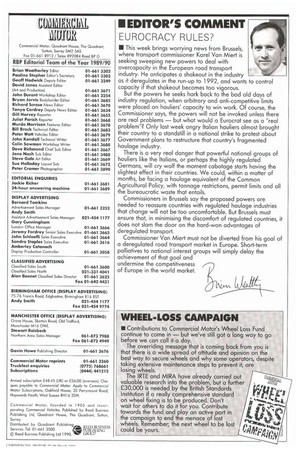EUROCRACY RULES?
Page 5

If you've noticed an error in this article please click here to report it so we can fix it.
• This week brings worrying news from Brussels, where transport commissioner Karel Van Miert is seeking sweeping new powers to deal with overcapacity in the European road transport industry. He anticipates a shakeout in the industry — as it deregulates in the run-up to 1992, and wants to control capacity if that shakeout becomes too vigorous.
But the powers he seeks hark back to the bad old days of industry regulation, when arbitrary and anti-competitive limits were placed on hauliers' capacity to win work. Of course, the Commissioner says, the powers will not be invoked unless there are real problems — but what would a Eurocrat see as a "real problem"? Only last week angry Italian hauliers almost brought their country to a standstill in a national strike to protest about Government plans to restructure that country's fragmented haulage industry. There is a very real danger that powerful national groups of hauliers like the Italians, or perhaps the highly regulated Germans, will cry wolf the moment cabotage starts having the slightest effect in their countries. We could, within a matter of months, be facing a haulage equivalent of the Common Agricultural Policy, with tonnage restrictions, permit limits and all the bureaucratic waste that entails.
Commissioners in Brussels say the proposed powers are needed to reassure countries with regulated haulage industries that change will not be too uncomfortable. But Brussels must ensure that, in minimising the discomfort of regulated countries, it does not slam the door on the hard-won advantages of deregulated transport.
Commissioner Van Miert must not be diverted from his goal of a deregulated road transport market in Europe. Short-term palliatives to national interest groups will simply delay the achievement of that goal and undermine the competitiveness of Europe in the world market.








































































































